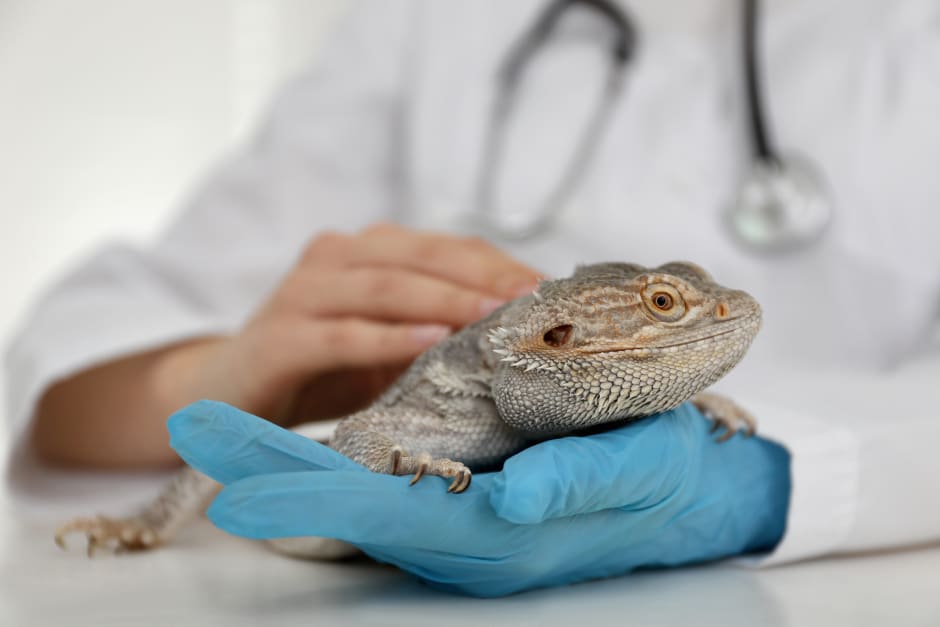Everyone knows veterinarians are trained healthcare professionals whose primary duties involve treating and caring for sick animals. What most people need to learn, however, is that there are different specializations when it comes to veterinary medicine.
Undoubtedly, one of the most exciting of these areas of specialization is the field of exotic animal veterinary medicine.
Simply put, exotic animal veterinarians care for animals such as reptiles, lizards, turtles, exotic birds, snakes, and even rodents.
Below, we look at the steps in becoming an exotic animal veterinarian, including the job scope, possible work environments, projected salary, and career outlook.
Who Are Exotic Animal Veterinarians?
While veterinary assistants and technicians are more exposed to the general pet population, exotic animal veterinarians specialize in treating exotic animals. But, of course, what this means itself is subject to further explanation.
You see, it used to be that exotic animals were only found in the wild and zoos, but nowadays, things have changed. More and more people are starting to keep exotic animals as household pets.
These aren’t limited to mammals alone but also avians, amphibians, and reptiles. One of the consequences is that there is now a growing demand for veterinarians who specialize in caring for these animals.
Exotic animal veterinarians are trained to be able to handle the specific demands and considerations involved in dealing with exotic animals that usually aren’t in play when it comes to regular companion pets.
What Do Exotic Animal Veterinarians Do?
During their careers, exotic animal veterinarians will most likely treat a variety of animals spanning various species. One of the best parts of being an exotic animal veterinarian is the expansive and diverse array of exotic animals they work with.
Some of their duties include performing surgeries for these animals, administering vaccinations against different diseases, and administering emergency care.
They will also use advanced equipment and techniques to diagnose and treat various ailments.
Exotic animal veterinarians also tend to find themselves in situations where they must administer sedation as a precautionary measure.
Work Environment
Many exotic animal veterinarians work at animal hospitals, usually in big cities. Some work at general animal hospitals with a department for exotic animals, while some work at hospitals specializing strictly in exotic animals.
Finding an exotic animal veterinarian working in wildlife reserves and rescue facilities is expected. Some dangerous venomous reptiles and primates that aren’t usually allowed in city hospitals can be treated here.
An exotic animal veterinarian may also work in zoos and marine sanctuaries.
How To Become an Exotic Animal Veterinarian
The following are the broad steps involved in becoming an exotic animal veterinarian in most states across the country:
Earn a Regular College Degree
Exotic animal veterinarians are expected to have an undergraduate degree before they enroll in an accredited veterinary school. Usually, the degree helps prepare them for some of the more specialized topics they will learn in vet school.
For this reason, interested candidates are advised to focus on regular college courses involving animal science, biology, zoology, chemistry, biochemistry, and more.
Having a regular college degree will also come in handy for securing admission into the top veterinary colleges.
Gain Admission into an Accredited Veterinary College
All exotic animal veterinarians are expected to attend a veterinary school. Enrolling only in veterinary schools accredited by the American Veterinary Medical Association (AVMA) is advisable for a more straightforward path toward employment and licensing.
There are 30 such schools nationwide, with a few more in Canada and the United Kingdom. Of these, only six have dedicated exotic animal veterinary medicine programs.
Top Programs for Exotic Animal Veterinarians
Since exotic animal veterinary medicine is not yet commonplace, aspiring exotic animal veterinarians are advised to attend accredited veterinary colleges with specialized departments for exotic animal veterinary medicine.
Some of the most noteworthy options in this regard include:
- University Of Illinois Urbana-Champaign College of Veterinary Medicine,
- Kansas State University College of Veterinary Medicine,
- Louisiana State University School of Veterinary Medicine,
- Oklahoma State University Center for Veterinary Health Sciences,
- Michigan State University College of Veterinary Medicine and,
- Washington State University College of Veterinary Medicine.
Pass the National Veterinary Licensing Exam (NAVLE)
All veterinarians are expected to pass a general exam known as the National Veterinary Licensing Exam (NAVLE) before they graduate from vet school. Students often sit for the exam during the fall semester of their senior year.
Graduate from an Accredited Veterinary College
The purpose of enrolling in an accredited college of veterinary medicine is to earn a Doctor of Veterinary Medicine degree and obtain proficiency in topics such as animal diseases, anatomy, and physiology, among others.
An exotic animal veterinarian can secure licensing and employment only after obtaining a DVM.
Gain Real-World Experience
As an exotic animal veterinarian, you will likely have to gain experience in the real world before securing employment. An internship is one of the most popular ways to fulfill this requirement.
Thankfully, several zoos in the country offer internship opportunities for future exotic animal veterinarians to learn under the supervision of experienced professionals in the field.
Soft & Hard Skills for Exotic Animal Veterinarians
As an exotic animal veterinarian, you must cultivate a handful of hard and soft skills before you start working professionally and continually throughout your career.
Some of the most important soft skills include:
- Problem-solving skills - Exotic animal veterinarians are usually involved in scenarios that require quick thinking and problem-solving. This is why it is essential to have sound problem-solving skills and develop solutions that may not seem initially apparent.
- Interpersonal skills - Exotic animal vets must also be able to interact with other people effectively and work as part of a team.
- Communication skills - Communication is vital when it comes to saving the lives of animals, and exotic animal veterinarians must be able to get their instructions across to fellow team members as concisely and effectively as possible.
- Customer service - Exotic animal vets often find themselves in scenarios where they interact with hospital clients or other individuals who come to them for their services. This is why having sound customer service skills is also quite important.
- Ability to work under pressure - Working with exotic animals can sometimes lead to high-pressure situations. A strange animal veterinarian must be able to keep their composure and perform optimally even under these conditions.
Some of the most influential hard skills include:
- Diagnostic testing - Exotic animal veterinarians must be able to run diagnostic testing to discover what is causing an animal’s disease and present condition.
- Preventive care - They must also be able to administer care aimed not at fixing problems but at preventing future injuries and diseases.
- Record-keeping - Exotic animal vets must also keep medical records to help in proper diagnostics and treatment.
- Analytical skills - An exotic animal veterinarian must be able to analyze data and situations to get a much more coherent picture of the event at hand.
- Technical skills - Exotic animal veterinarians must have sound technical skills, including utilizing mechanical and mathematical thinking to solve problems.
- Management skills - Lastly, an exotic animal veterinarian must be able to manage the business side of the job, delegate duties, and oversee the day-to-day running of a clinic.
State Licensure Requirements
As with all veterinarians, exotic animal veterinarians are expected to obtain a license from their respective states before practicing professionally.
The requirements involved in obtaining this license usually vary from state to state. Still, it is common for the responsible state board to demand that candidates must have earned a university degree and a Doctor of Veterinary Medicine (DVM) from an accredited college of veterinary medicine.
Jurisprudence and veterinary laws and regulations exams are also often included. Most licenses last for 1 - 3 years before they are to be renewed through continuing education.
Board Certification
Even though certification is not mandatory, exotic animal veterinarians should pursue board certification. This is because accreditation tends to give exotic animal veterinarians an edge over the field while earning the respect of their peers and making them more appealing to employers.
One of the best approaches in this regard is to obtain certification from the American Board of Veterinary Practitioners (ABVP). The board has a specialist credential for exotic animal veterinarians, the Exotic Companion Mammal Practice credential.
Another option is to go with the American College of Zoological Medicine (ACZM) certification, specifically in its “Zoological Companion Animals” subcategory.
Candidates may have to accrue a few years of experience before qualifying for these credentials.
Salary and Career Outlook
According to data provided by Indeed, exotic animal veterinarians in the United States earn an annual average salary of $85,171. One of the reasons for their high salary is that there are relatively few exotic animal veterinarians compared to the demand for the profession.
On the upper end of the salary spectrum, exotic animal veterinarians who earn the most can earn up to $109,128, while those in the bottom 10% take home an annual average salary of $66,473.
The Bureau of Labor Statistics provides general career projection data for veterinarians. The same projection applies to all fields of veterinary medicine, including exotic animal veterinarians.
According to this data, the demand for the profession is set to increase by 19 percent between 2021 and 2031.





